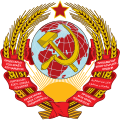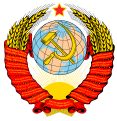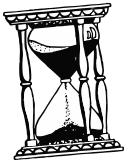Sovjetunionens nationalvåben
Sovjetunionens statslige nationalvåben (russisk: Государственный герб СССР) blev indført i 1923 og blev benyttet indtil Sovjetunionens opløsning i 1991. Teknisk set er det et symbol frem for et nationalvåben, siden det ikke følger heraldikkens regler. På russisk blev det kaldt герб (våbenskjold) ordet for et traditionelt nationalvåben. Indskriften på båndet, der omgiver kornaksene, er Proletarer i alle lande, foren jer! på alle unionsrepublikkernes sprog.
Galleri
- Sovjetunionens statslige nationalvåben fra (1923–1929)
- Sovjetunionens statslige nationalvåben fra (1929-1936)
- Sovjetunionens statslige nationalvåben fra (1936–1946)
- Sovjetunionens statslige nationalvåben fra (1946–1956)
- Sovjetunionens statslige nationalvåben fra (1956–1991)
Eksterne henvisninger
| Spire Denne historieartikel er en spire som bør udbygges. Du er velkommen til at hjælpe Wikipedia ved at udvide den. |
| Spire Denne artikel om et rigsvåben eller statsvåben er en spire som bør udbygges. Du er velkommen til at hjælpe Wikipedia ved at udvide den. |
Medier brugt på denne side
The State Emblem of the USSR consists of a hammer and sickle upon the terrestrial globe, depicted within the rays of the Sun and framed by the heads of stalks of wheat, with the legend in the languages referred to in Art. 34 of the Constitution of the USSR: “Workers of all countries, unite!” Above the emblem there is a five-pointed star. June 6, 1923, the IInd section of the CEC [Central Executive Committee] of the USSR accepted the drawing of the emblem of the USSR (concurrently with the adoption of the draft Constitution of the USSR). September 22 1923 the drawing of the emblem was finally approved by the Chairman of the Presidium of the Central Executive Committee of the USSR, A. S. Enukidze. The Constitution of the USSR in its adoption by the IInd Congress of the Soviets of January 31, 1924, officially recognized the legal status of the Emblem of the USSR.
Coat of arms of the Union of Soviet Socialist Republics 1946 to 1956
COA from 1936-46
Emblem of Soviet Union from 1929-1936, based from: file:Coat_of_arms_of_the_Soviet_Union_(1923–1936).svg, This picture, and Heraldicum.ru
Forfatter/Opretter:
- WikiProject Heraldry and vexillology logo.svg: S. Solberg J. / *derivative work: Perhelion
Logo for WikiProject Heraldry at German Wikipedia











